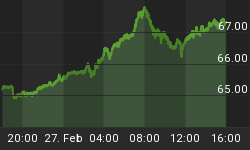Perverse Central Bank Battle
In the perverse central bank battle to defeat price deflation, the central banks are having a rough go of things.
The price of West Texas Intermediate (WTI) light sweet crude is down 6 percent today to lows last seen late 2008 and January 2009.
West Texas Crude Monthly

There has not been a WTI monthly close lower than $38.69 since May of 2004 when it closed at $37.04. A chart of Brent crude looks similar.
Brent Crude Monthly

Saudi Arabia Throws Down Challenge
Last week, oil producers met. Some member states sought production cuts. Saudi Arabia responded with an Output Cut Challenge.
Saudi Arabia agreed to output cuts if rivals inside and outside the OPEC cartel agreed to cuts. This was a change in tone from Saudi Arabia, but no agreement was reached.
At an informal meeting ahead of last Friday's official meeting, Russia and Iran Rejected the Saudi Proposal.
Saudi Arabia has long insisted it would cut production only if fellow OPEC members and non-OPEC countries joined in. The report quoted a senior OPEC delegate as saying the Saudis would agree to cuts if Iraq freezes production rises and Iran and non-members such as Russia, Mexico, Oman and Kazakhstan contribute.
But Russia and OPEC members Iran and Iraq quickly rejected the idea. OPEC and non-OPEC producers have not cooperated to tackle low oil prices since they joined forces 15 years ago to help the market recover from the 1998 financial crisis.
"We do not accept any discussion about increases of Iran production after the lifting of sanctions. It is our right and anyone cannot limit us to do it. We will not accept anything in this regard," Iranian oil minister Bijan Zangeneh told reporters in Vienna before the informal meeting.
Oil Price Deflation Factors
- Increased supply, especially in the US
- Falling global demand, especially in China
Gas Prices Below $1.50
Gas prices are a function of oil prices, state gasoline taxes, and proximity to refineries. As of November 30, Gas Prices Fell Below $1.50 at some stations.
The price of a gallon of regular now stands at $2.04 nationally, down 14¢ compared to one month ago and 74¢ lower than this time last year. In early 2015, the national average dropped near the $2 mark but never crossed it. But AAA and others anticipate that we'll dip below the $2 threshold within a matter of days.Many gas stations are already well below that watermark. "Nearly two-thirds of the nation's 130,000 gas stations now are selling that gasoline for under $2/gallon, a remarkable change from a year ago, when 0% of stations were under $2," GasBuddy reported this week.
In some extraordinary cases, the price of a gallon of regular is much lower than that--like under $1.50. Several gas stations in parts of Texas are posting prices of $1.40 to $1.45 per gallon, according to GasBuddy. CNN reported on Monday that the nation's cheapest gas is being pumped out of a Sam's Club gas station in Lafayette, Indiana, where a gallon of regular costs an astonishingly cheap $1.39.
US Rigs Down 60%, Production Down 3%
In the US, despite the fact that oil cannot be economically produced at prices under $50 per barrel, production has dropped off only a small amount.
For details please see Oil Patch Problems: Rigs Down 60%, Production Down 3%, $40-$50 Price Doesn't Work.
Central Banks to Blame
Central bankers brought this mess upon themselves. By cheapening interest rates, financing of rigs became too easy. With expectations oil prices would stay high, rig counts soared. Now the energy sector is in a mess.
And it's not just the energy sector that's a mess. Central bank actions lifted asset prices globally. Home prices there were affordable in 2009 no longer are affordable. Millennials cannot afford houses so they hold off on family formation.
Population Deflation
As a direct result of central bank actions, we see self-reinforcing population deflation coupled with asset price inflation. It's especially pronounced in Europe and Japan.
For additional discussion, please see Population Deflation: Spain Joins Germany with Negative Net Birth Rate; Italy on Threshold; Who's to Blame?
Price Deflation a Good Thing
Falling oil prices are a good thing. In fact, routine deflation is a good thing. Even the BIS agrees.
On Sunday, the BIS blamed central banks for "unthinkable" interest rates: BIS Points Finger at Yellen, Draghi: Warns About "Unthinkably" Low Interest Rates, Bond Market "Dislocations"
Finally, please consider Historical Perspective on CPI Deflations: How Damaging are They?
Price deflation is not damaging at all to banks or anyone else. Asset bubble deflation is.
Yet, here we are on the verge of another asset bubble bust, and the Fed not only doesn't see it coming, the Fed will not admit they caused the bubble when it does burst.















